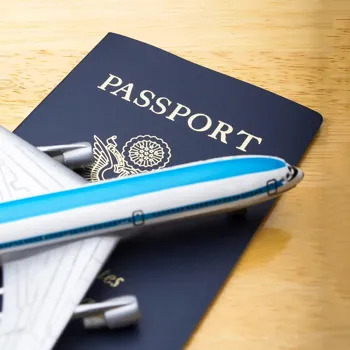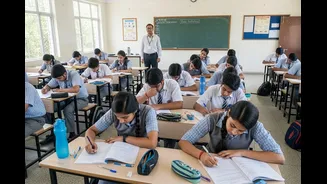Unveiling the secrets of essential travel documents! Don't risk your trip - read on for a stress-free journey
Planning a trip, be it a quick weekend getaway to Goa or a grand tour of Europe? Excitement
is natural, but amid the packing frenzy, it's easy to overlook the most crucial element: your travel documents. Imagine reaching the airport only to realize you've left your passport behind!
A nightmare, right? To avoid such travel disasters and ensure a smooth, stress-free journey, here's a list of 10 essential travel documents you should absolutely never leave home without.
Consider this your ultimate pre-travel checklist, ensuring you're prepared for anything the journey throws your way. After all, a well-prepared traveler is a happy traveler!
So, grab a pen, make notes, and get ready to embark on your adventure with confidence, knowing you've got all your bases covered. Don't let a missing document ruin your hard-earned vacation. Let’s dive into the list, shall we?
Passport validity crucial for hassle-free international travel
Firstly, and perhaps most obviously, your passport is your golden ticket to international travel. Ensure it's valid for at least six months beyond your intended stay.
Airlines often deny boarding if your passport doesn't meet this validity requirement, even if your destination country doesn't explicitly require it. Check the expiry date well in advance and renew it if necessary.
Make a photocopy of the passport's information page and keep it separately from the actual document. A digital copy stored securely on your phone or in your email is also wise.
In case of loss or theft, having copies of your passport details will significantly expedite the process of obtaining a replacement from your embassy or consulate. Apart from validity, also check for blank pages. Many countries require at least one or two blank pages for entry and exit stamps.
Running out of space can lead to unexpected hiccups at immigration. So before you finalize your travel plans, double-check these crucial details to avoid any unwanted surprises at the airport or border.
Visas are crucial for travel; research requirements early to avoid issues
Next up, we have visas. While your passport grants you general permission to travel, a visa is a specific authorization granted by a particular country allowing you to enter its borders.

Visa requirements vary depending on your nationality and your destination, so it's crucial to research the specific requirements well in advance. Some countries offer visas on arrival, but relying on this can be risky, as policies can change without notice.
Applying for a visa in advance gives you peace of mind and avoids potential delays or denial of entry. The application process can sometimes be lengthy and involve submitting various documents, so start the application process early.
It's also prudent to check if you need transit visas for any countries you'll be passing through on your way to your final destination. Failing to have the necessary transit visas can result in you being stranded at an airport, disrupting your entire travel plan.
Websites like the Ministry of External Affairs website provide comprehensive information on visa requirements for Indian citizens traveling abroad and also keep a record of your application for any future support.
Flight tickets are crucial for travel, ensure accuracy, check-in early, and keep copies handy
Third, flight tickets, be it physical printouts or e-tickets on your phone, are your proof of purchase and confirmation of your reserved seat on the airplane. Double-check your name, flight number, dates, and times on the ticket to ensure everything is accurate.
Airlines often require passengers to check in online before arriving at the airport, especially for international flights. This not only saves time at the airport but also allows you to select your preferred seat.
Download your boarding pass to your phone or print it out, keeping both digital and physical copies handy. In case of flight delays or cancellations, having your ticket readily available will make it easier to rebook or claim compensation.
Additionally, if you have connecting flights, make sure you have sufficient time between flights to navigate through the airport and transfer to your next gate. Remember to keep your tickets in a secure and easily accessible location, especially during airport transits.
Carry essential identification documents for travel safety
Identification documents beyond your passport are also essential, particularly for domestic travel or situations where you need to prove your identity. Aadhar card, PAN card, driver's license, or voter ID card are all valid forms of identification in India.
Carry at least one of these documents with you at all times, especially when traveling by train or bus. Some hotels may also require identification at check-in. For international travel, while your passport is the primary form of identification, it's still wise to carry a secondary ID.
This can be useful in situations where you need to prove your identity but don't want to risk carrying your passport around. Keep your ID cards safe and secure, and be mindful of the potential for identity theft. Avoid carrying unnecessary documents that contain sensitive personal information.
Consider storing digital copies of your ID cards on your phone or in a secure cloud storage account as a backup.
Health and vaccination records key for travel post-pandemic
Health and vaccination records are also vital, especially in the post-pandemic era. Some countries require proof of vaccination against certain diseases before allowing entry. Check the specific vaccination requirements for your destination and ensure you have the necessary documentation.
Keep your vaccination certificate readily available, either in physical or digital format. Carry a copy of your medical records, particularly if you have any pre-existing medical conditions or allergies. This information can be crucial in case of a medical emergency.
If you are taking any prescription medications, ensure you have a sufficient supply for your entire trip and a copy of your prescription. Some countries may have restrictions on certain medications, so it's essential to research and comply with local regulations.
Pack a basic first-aid kit with essential medications, bandages, and antiseptic wipes.
Travel insurance is vital for medical emergencies and trip protection
Finally, Travel insurance details is often an overlooked document, but it is one of the most important. Travel insurance provides coverage for medical emergencies, trip cancellations, lost luggage, and other unforeseen events.
Review your policy carefully to understand the coverage provided and the claims process. Keep a copy of your insurance policy and contact information readily available. In case of an emergency, you'll need to contact your insurance company to initiate a claim.
Inform your insurance company of your travel dates and itinerary. Some policies require pre-approval for certain medical treatments or procedures. Having travel insurance gives you peace of mind knowing that you are protected against unexpected events.
Compare different travel insurance policies to find one that meets your specific needs and budget. Make sure to choose a policy that provides adequate coverage for medical expenses, trip cancellations, and lost luggage.
AI Generated Content. Glance/InMobi shall have no liability for the content












